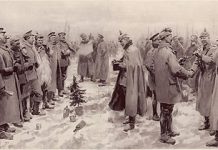Truth confirms truth and the general truths of the Faith promote this particular truth that the complete citizen is a free man working upon the land – Hilaire Belloc, Flee to the Fields 16).
This is a pretty dynamic statement. Is Belloc saying that non-landowners are not complete citizens? Well, yes and no; there is a truth to his assertion which needs to be fleshed out. Various popes have spoken about man’s right to private property and the dignity of labour, and how that relates to family and society. Current society devalues the family, and building a culture of life is necessary to combat social evils. A widespread return to family farming will be part of the solution. Firstly, it places families at the centre of society, partly by providing the practical means for autonomy from State intervention. It also promotes community over individualism, personalizes business transactions, and stabilizes the economy. Farming also exemplifies that work is holy, and should be meaningful for the worker. As a providential being, man should have some ownership in the work that he does, so that he is not subject to wage slavery. Finally, its communal nature makes family farming an important part of building culture; for, “the family is the heart of the culture of life” (C.A. 39), and contributes to a way of life ordered towards man’s final end. Thus, there should be a return to a more localized economy, rooted in work on the land.
Land and Labour
Rerum Novarum — the 1891 landmark papal encyclical promulgated by Pope Leo XIII in response modern social errors, especially those deriving from the industrial revolution — addresses this issue partly by emphasizing the centrality of the family unit within society. The Pope states that the family “has rights and duties” (R.N. 12) which are outside of the State’s domain, and therefore the structure of society must either “safeguard and strengthen” (R.N.14) the family, or step back. “If the families” says Pope Leo XIII, “on entering into association and fellowship, were to experience hindrance in a commonwealth instead of help, and were to find their rights attacked instead of being upheld, society would rightly be an object of detestation rather than of desire” (R.N. 13). Centesimus Annus — promulgated by Pope John Paul II on the hundredth anniversary of Rerum Novarum — reaffirms the centrality of the family, stating that, “the first and fundamental structure for ‘human ecology’ is the family” (39), not “the production and consumption of goods” (C. A. 39). Businesses should therefore support family life and help it to flourish.
In our current society, the family is not at the centre, having been replaced by “an individualistic mentality” (C.A. 49). Individual advancement is extolled in the workplace, and trade is largely enacted between strangers (Maxwell, Flee to the Fields 123). Many occupations even hinder family life. One 20th century writer, in his essay, “The Reconstruction of the Crafts,” went so far as to claim that any work which takes man away from the home is detrimental to family life: “It would seem to be self-evident that an organization of society in which the man’s work is in one place and his home and family in another place is a danger to home life and family life” (Maxwell, Flee to the Fields 75). Considering modern society’s attacks on the family, renewing its central place is of primary importance. Family farming promotes a localized economy, thereby providing the primordial framework for a community in which family life is at the centre.
To thrive, families need autonomy from the State on a practical level. Leo XIII states that, “man precedes the State, and possesses, prior to the formation of any state, the right of providing for the substance of his body” (R.N. 7). Rerum Novarum was responding to the evils of socialism, which sought to eliminate private property as a remedy to the suppression of the working class (R.N. 3-4). Yet removing private ownership makes man a greater slave to the State, since he has no control over the means of production. Pope St. John Paul II re-affirms the rights of families and individuals, stating that, “the individual, the family, and society are prior to the state,” and “the state exists in order to protect their rights and not to stifle them” (C. A. 11). Applying this to family farming, rural communities are better equipped to maintain this autonomy, because they have the practical means of providing for themselves without relying on the government.
Family farming also leads to a more stable economy, through a community supported by localized production. Autonomy from the State means people need their neighbours, for “many goods cannot be produced through the work of an isolated individual” (C. A. 32). A society that depends upon many localized producers will be more economically stable than one reliant upon a centralized means of production. For example, if two or three meat processing plants supply a vast population, shutting them down will deprive a large population of access to meat. On the other hand, many local producers spread out the food production, thereby supporting a more stable economy.
Localized production also limits consumerism, which involves a disordered relationship towards physical goods. The Church speaks against consumerism, stating that, “in their desire to have and to enjoy rather than to be and to grow, people consume the resources of the earth and their own lives in an excessive and disorderly way” (C. A. 37). Knowing who made something, and the care that went into it, fosters contentment for what one already has. To illustrate: compare a pair of shoes purchased in a factory in China, to those made by a local shoemaker. One is flashy and fading, while the latter is enduring, carries memories, and keeps meaningful labour in the local community. The same idea can be applied to farm produce.
This principle ties into the nature of work itself. The work one does ought to be meaningful, because work itself is good and holy. “Man’s life is built up every day from work, from work it derives its specific dignity” (Laborem Exercens 1). Work makes life more human, for it is how man fulfills his vocation. John Paul II reminds us that, “God has placed [the world] in human hands, so that people may make it fruitful and more perfect through their work” (C. A. 51). The value of work must therefore be recognized in order to understand the social issues man is currently facing (L.E. 3).
Work is accomplished for two reasons: provision and fulfillment. These are referred to as the objective and subjective dimensions of labor. The objective dimension refers to man’s physical need to provide for himself, while the subjective dimension refers to work as it perfects man as a person. The subjective sense is prior in dignity because man is created in the image of God — imago Dei — and as such, the creative work he does helps shape his soul. Work is valued for its perfection of man as a person, as stated in Laborem Exercens: “The primary basis of the value of work is man himself, who is its subject” (6). This is contrary to the erroneous and subtly pervasive idea that man must be a slave to his work in order to be societally successful. Pope Leo also puts the notion of work into an eternal perspective, stating: “Life on earth, however good and desirable in itself, is not the final purpose for which man is created; it is only the way and the means to that attainment of truth and that love of goodness in which the full life of the soul consists” (R. N. 40). Thus, man has an obligation to order his earthly life towards eternity, and ought to seek work that is meaningful for the purpose of fulfilling his eternal as well as his bodily needs.
The Family Farm
So how does this relate to farm work? Imagine a farm as a little kingdom, which man is able to shape after his own interests and according to his vocation. His labor is meaningful because it is wholesome and free. Working with the soil and animals is itself satisfying; the feeling of “a good day’s labour” upon his own land is rewarding; and difficulties inherent in farm work make him find creative ways to solve problems. Dependence upon the seasons also reminds the farmer of God’s providence. Thus, farm work provides a sense of fulfillment which is made possible by the ownership of private property.
Man, made in the image of his Creator, is also a providential being. “Man is the image of God partly through the mandate received from his Creator to subdue, to dominate the earth” (L.E. 4). This refers primarily to the soil itself, and then to the products that flow from the raw materials of the land (L.E. 1), for “those who do not possess the soil contribute their labor” (R.N. 8). As a providential being, man is entrusted with the task of providing for himself and his family: “it is a most sacred law of nature that a father should provide food and all necessaries for those whom he has begotten” (R. N. 13). Man must be free to pursue the means to fulfill this obligation. Hence, it is his primordial right to possess the soil (R.N. 7). Divini Redemptoris, Pius XI’s 1937 critique of communism, reiterates this, listing “the right to possess and use property” (27) among man’s God-given human rights. Thus, for man to be truly providential, he must be free to own land and labor upon it as he sees fit (L.E. 14).
The providential nature of man precludes the idea that man should be largely dependent upon the State. Such a condition on a widespread scale weakens man’s ability to fulfill his vocation. Centesimus Annus calls out the dangers of wage-slavery:
A person who is deprived of something he can call “his own,” and of the possibility of earning a living through his own initiative, comes to depend on the social machine and on those who control it. This makes it much more difficult for him to recognize his dignity as a person, and hinders progress towards the building of an authentic human community (C.A. 13).
The Church encourages private ownership, so that man is not reduced to a “cog in the state machine” (C.A. 15). This is one reason why businesses should be privately owned and run like a family (or even better, as a family). In this way, labour assumes the subjective dimension that is so necessary to man’s fulfillment.
Family farms help fulfill the subjective dimension of labour through community and in the labour itself. Farm work is communal in nature, because it quite often makes one rely on one’s family and community to keep the farm running. Working on the land also keeps people closer to home, thus establishing a more rooted community. Additionally, the work is noble and fulfilling of itself. As Chesterton quipped: “you can treat a man as a slave, but you cannot at the same time produce out of mere food the sensation of freedom” (Chesterton, Flee to the Fields, 19).
Picture this for a moment: you are sitting down to a mid-winter supper with friends, with a plate of garlic potatoes, steak, carrots and beans, seasoned with dried herbs and slathered in homemade butter, with apple crumble for dessert. Everything was grown either by you, or purchased from a neighbour. This takes the enjoyment of the meal to a deeper level, because you know the story behind it — that frigidly cold day harvesting potatoes, and the warmth of the summer sunshine as you fixed fences for cattle. Take this a step further, and suppose that your children happen, at the moment, to be wildly absorbed in making and trading wooden swords with their friends, whose parents sold you the apples. Suddenly, the meal not only nourishes you, it displays the fruit of your labour within a community setting. John Paul II affirmed that, “the work of agriculture, which provides society with the goods it needs for its daily sustenance, is of fundamental importance” (L.E. 21) and is “the basis for a healthy economy” (L.E. 21). Farm work must be understood not merely as the production of food, but as a lifestyle which promotes a good culture.
Culture, Christ and Catholicism
What is culture, and what does it mean to promote a good culture? In a nutshell, culture is the climate of one’s community. It is built by human decisions and interactions, for “all human activity takes place within a culture and interacts with culture” (C. A. 51). This is something that permeates everything one does, in which “the involvement of the whole human person is required” (C. A 51). The correct vision of culture flows from the Christian understanding of the human person and the proper structure of human relations, beginning with the family and flowing outwards from there (C.A. 13).
In today’s culture, much of life involves a “dramatic conflict between the “culture of death” and the “culture of life”” (Evangelium Vitae 50). One way to counteract the culture of death is to follow Pius XI’s urging to, “return to a more moderate way of life,” and deny oneself “for love of the neighbour” (D.R. 48). Certain moderations in lifestyle come part-and-parcel with the traditional farming lifestyle, since farm work often requires almost constant attention. What is gained is very real connection to the soil, the seasons, and one’s community, which is fulfilling and life-giving.
Culture is built by individual choices, for “even the decision to invest in one place rather than another… is always a moral and cultural choice” (C.A. 36). Selling and purchasing goods may seem like isolated transactions, yet they are connected to how man supports his family, and are therefore a big part of shaping culture. “Work has a social dimension through its intimate relationship not only to the family, but also to the common good” (C.A. 6). Laborem Exercens talks about this in terms of direct and indirect employers (17). While the direct employer influences the employee’s daily life, indirect employers include everyone supporting a certain mode of production by their actions or spending, thereby influencing what gets produced and how. Thus, each person holds some responsibility for shaping their culture in accordance with what they value (L.E. 17).
Since culture is based on individual decisions, is man therefore obliged to support meaningful work within his community? John Paul II states that, “it is necessary to create lifestyles in which the quest for truth, beauty goodness and communion with others for the sake of common growth are factors which determine consumer choices, savings, and investments” (C. A. 36). This could be achieved by cultivating wholesome communities right at home. A man cannot stay within his community without work; therefore, there must be some obligation to support wholesome endeavours within one’s community. Family farming helps to create lifestyles of goodness, truth, and beauty within culture, through supporting wholesome work in one’s family and among one’s neighbours.
Small societies are needed to fulfill man’s social nature, for people need to love and be loved (C.A. 40). There are three ways family farming helps create the structure for small societies to thrive. Firstly, working on the land encourages young people to stay in their home community. Building strong little societies requires commitment and time; hence, deep roots in one place are a big asset. (This is why emigration, while sometimes necessary, is nonetheless, in the Pope’s words, an ‘evil’ because it tears one away from one’s own culture and land, even if at times it must be tolerated for a greater good (L.E. 23)).
Secondly, small farmers need the help of their neighbours to survive through tough times, which builds communities in which people look out for one another. Lastly, there are limits to how productive one man can be on his own. He must often trade with his neighbours, which builds those relationships. When building culture, “the first and most important task is accomplished within the heart” (C. A. 51). Thus, small societies are needed to reach hearts, and family farming not only creates space for a family to thrive, it allows the structure for small societies to flourish.
Since culture is built primarily in the heart, a truly thriving culture is one built upon Faith. The spiritual life and man’s ability to live well go hand-in-hand; for, unaided by grace, man cannot fix his problems. Thus, the best way to restore culture is to know and live the Faith well (D.R. 43). Society must be founded upon the Faith, for “everything must crumble that is not grounded on the one corner stone which is Jesus Christ” (D.R. 38). Thus, man ought to order his life to live out his Faith in his labour.
A culture rooted in Christ will also be more fruitful in its work. Maxwell states that, “whenever and wherever the crafts have attained their greatest excellence there has always been manifested in the external order of society a religious ideal” (Flee to the Fields 127). Work is not just a way to get money; it is an earthly means of sustenance that must be directed towards man’s ultimate end — heaven. In this way, a man will love what he does, and thus bring joy into his everyday life. Again, to quote Maxwell: “when a man has the intellectual habit of directing all his work to his last end, there is also a sense in which his work may be an end in itself; done for its own sake, because he loves it” (Flee to the Fields 127, emphasis added). Thus, the ultimate solution to cultural problems is to re-establish God at the centre of everyday life.
A return to primary crafts, such as farming, enables man to have more freedom over how he lives out his Faith. For example, if he is self-employed, it is within his grasp to safeguard Sundays as a day of rest. Farming makes possible a cultural mindset-shift towards life, because one is free to direct one’s time and resources as one sees fit. A man can thus shape his labour according to the Faith, so that all of life becomes more vividly liturgical. This contrasts with the continual moral compromises often present in workplaces. To create a culture of life, one’s worship, work and community ought to be incorporated and rightly ordered, for “man is an organic whole, soul and body, a unity of the rational and animal, and all his actions must conform to this unity” (Maxwell, Flee to the Fields 121). Family farms are free to build a culture centred around life rather than just business, and are therefore essential in re-building Catholic Culture.
While not all men may be called to farm, there should be widespread return to family farming. Such a lifestyle places the family at the centre of society, builds stronger communities, and allows man to pursue meaningful labour. Most importantly, it builds a culture of life, in which man is able to order his life in accordance with the Faith. Society ought therefore to love the family farms, and it is possible, as Belloc says, that a stronger connection to the land would make citizens more ‘complete,’ in the sense of an entire culture that is more free.
Works Cited
Rev. John McQuillan, D.D.; Commander Herbert Shove, D.S.O., R.N.; H. Robbins; Very Rev. Vincent McNabb, O.P., S.T.M.; Captain Reginald Jebb, M.A.; Right Rev. Monsignor J. Dey, D.S.O.; K.L. Kenrick, M.A.; George Maxwell; Rev. H.E.G. Rope, M.A, Flee to the Fields: The Founding Papers of the Catholic Land Movement (USA, IHS Press, 2003)
Pope John Paul II, Centesimus Annus, Encyclical, 1 May 1991
Pope Leo XIII, Rerum Novarum, Encyclical, 15 May 1891
Pope John Paul II, Laborem Exercens, Encyclical, 14 September 1981
Pope Pius XI, Divini Redemptoris, Encyclical, 19 March 1937
Pope John Paul II, Evangelium Vitae, Encyclical, 25 March 1995












